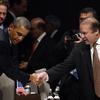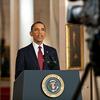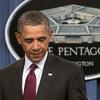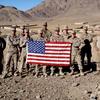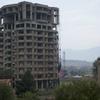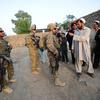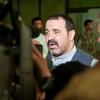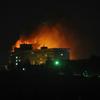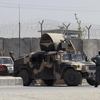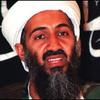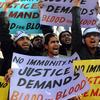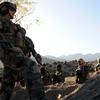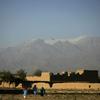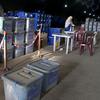Christine Fair appears in the following:
The U.S. & Pakistan: An Uncertain Future
Wednesday, May 28, 2014
U.S. May End Drone Strikes in Pakistan
Monday, August 05, 2013
The Search for the Next Sally Ride
Wednesday, July 25, 2012
The Agenda: Osama bin Laden, May Day Protest, April Jobs Report
Monday, April 30, 2012
Tensions High as President Obama Prepares to Meet with Pakistani Prime Minister
Monday, March 26, 2012
Rethinking Afghanistan After Civilian Killings
Tuesday, March 13, 2012
Information continues to trickle out about the American Army Staff Sergeant who allegedly killed 16 Afghan civilians over the weekend. Who is he? What were his motives? For some, the killings have prompted very different questions about the longest war in American history. Perhaps most importantly, how much longer should America be engaged in the region at all?
The Haqqani Network's Influence in Pakistan and Afghanistan
Monday, September 26, 2011
Jalaluddin Haqqani has called his militant outfit the most deadly insurgent group in Afghanistan, and a recent New York Times article called the Haqqani network a "ruthless crime family." Many top American officials are convinced that Pakistan's Inter-Services Intelligence has been working with the militant outfit. Their latest attacks include a strike on the U.S. embassy in Kabul.
Helicopter Crash Highlights American Strategy in Afghanistan
Monday, August 08, 2011
The Taliban has claimed responsibility for a helicopter crash on Saturday, which killed 30 American troops in the deadliest day ever for U.S. forces in Afghanistan. The attack took place in the Tangi Valley of Wardak Province, to the west of Kabul, and illustrates how the insurgency is growing from its traditional strongholds and edging toward the capital city.
Ahmed Wali Karzai Is Dead: What Is In Store for Kandahar?
Wednesday, July 13, 2011
Ahmed Wali Karzai, Afghan President Hamid Karzai's half-brother and head of Afghanistan's Kandahar provincial council, was killed early Tuesday morning at his home. The Taliban has claimed responsibility for the assassination, though their claims remain unconfirmed. Karzai was a powerful figure in Kandahar and his death may result in an unpredictable struggle for power, impacting U.S. goals in the region.
Terrorist Attack on Kabul Hotel
Wednesday, June 29, 2011
The Hotel Interncontinental in Kabul, Afghanistan was attacked by gunmen and suicide bombers yesterday. Gun fire was exchanged between the terrorists and police force for many hours, and ended with NATO helicopters shooting and killing three militants on the hotel's roof. The identity of the terrorists has not been confirmed yet, but many believe the Taliban are responsible.
How Soon Could U.S. Troops Exit Afghanistan?
Monday, June 20, 2011
Over the weekend, Afghan president Hamid Karzai lashed out at coalition forces on state television, suggesting NATO was in his country for "their own purposes." U.S. officials fired back, suggesting that such statements may hasten a withdrawal of troops despite continuing challenges to Afghanistan's government. This rhetorical tit-for-tat illustrates a larger argument that grows even more heated as taste for the war across the country and in Washington lessens. Is it time to get out completely? And if so, how?
Pakistan's ISI Under Microscope
Tuesday, May 10, 2011
Pakistan's Inter-Services Intelligence agency (ISI) has received heavy scrutiny from the United States, after a raid by U.S. special forces on a compound in Abbottabad, Pakistan, lead to the killing of Osama bin Laden. Information gathered from the raid suggests bin Laden had been living in that compound for close to six years. Many question the circumstances of the most wanted man in the world had been living safely within Pakistan's borders, in a $1 million compound, for that long without anyone in the ISI knowing. However, with U.S.-Pakistan relations at stake, it is necessary to pay close attention to evidence and not jump to conclusions, says Christine Fair.
Bin Laden Death: Terrorism Killer or Creator?
Monday, May 02, 2011
How will the world react to the death of Bin Laden? Or perhaps more significantly, how will the world of terrorism react? We speak with Lydia Khalil, former counterterrorism analyst with the NYPD, as well as Christine Fair, assistant professor at the Center for Peace and Security, to learn more.
Pakistan to US Ops: Get Out
Tuesday, April 12, 2011
It's been several weeks since the CIA operative Raymond Davis was released from custody in Pakistan for reportedly killing two armed men in a traffic incident in Lahore, Pakistan. Since his release, relations between the US and Pakistan have been strained. The tensions have grown not only over the questions relating to the diplomatic immunity of Raymond Davis and his 47 days of detention, but also over a US drone attack that killed tribal leaders last month. Now Pakistan is demanding that the United States sharply reduce the number of CIA and Special Ops forces working in the country, and put drone strikes on hold.
Violent Protests in Afghanistan, Blame Karzai?
Monday, April 04, 2011
The U.S. media disregarded the March 21st Quran burning at Terry Jones' Florida church. However, on March 24th, Afghanistan's President Hamid Karzai released a press statement calling for the pastor to come to justice. This statement set off a wave of violent protests in Afghanistan, which have killed dozens of people. Christine Fair, assistant professor at Georgetown's Center for Peace and Security Studies contextualizes Karzai's actions and the resulting violence.
CIA Contractor Raymond Davis Freed
Wednesday, March 16, 2011
CIA contractor Raymond Davis has been freed from a Pakistani prison and his murder case has been dropped. He was indicted on two counts of murder in the shooting deaths of two Pakistani men that, he says, were trying to kill him. Pakistani officials say Davis was pardoned by the families of the victims in exchange for compensation. Christine Fair, assistant professor at Georgetown's Center for Peace and Security Studies. She believes that the families were urged by Pakistan's secret security forces, ISI to accept the money. How will this latest development affect U.S.- Pakistan relations?
Pakistan's Ruling Coalition Loses a Political Party, Undermining Stability
Monday, January 03, 2011
Pakistan's second largest political party has abandoned Prime Minister Yusuf Raza Gilani's coalition to join the opposition, depriving the government of its majority and weakening a key United States ally. How does this defection affect Pakistan, and the two nations' work in Afghanistan and against the Taliban? We're joined for more on the story by Aleem Maqbool, Pakistan correspondent for our partner the BBC.
Talks Crumble Over Impostor Claiming to Be Senior Taliban Commander
Tuesday, November 23, 2010
For months, secret talks between Taliban and Afghan leaders have been inching along towards an agreement to end the war in Afghanistan. They've been helped by senior Taliban commander Mullah Akhtar Mohammad Mansour. But it turns out he was an impostor. We're joined by Professor Christine Fair, from the Center for Peace and Security Studies at Georgetown University, to learn more about the story.
Making Bread, Making Allies: Efforts to Reintegrate the Taliban
Tuesday, November 16, 2010
In Afghanistan, our partners the BBC have gained rare access to an American prison for Taliban fighters. The BBC's Paul Wood spent time at the Parwan facility and explains how efforts are being made to ready Taliban members to re-enter society by teaching them useful skills, including bread making.
Afghan Elections Marred by Violence, Fraud
Monday, September 20, 2010
Afghan voters went to the polls this weekend to cast their ballot in parliamentary elections. More than 2,500 candidates ran for 249 seats. According to reports from Afghanistan, many candidates tried to buy the election by paying voters for their ballots and busing crowds of people into polling stations. Meanwhile, election day quickly turned violent in some locations, with dozens of rocket attacks and violence at polling stations. The New York Times reported that more than 12 people were killed in election-related violence. Due to security concerns, some polling stations remained closed or had very little voter turnout.
